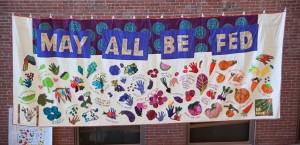Every February in Vermont, just as lush fields and abundant gardens are distant memories, the Northeast Organic Farming Association (NOFA) holds their winter conference. The theme of the 2015 conference was ‘Growing the Good Food Movement’ focusing on building a fair and just food system. The keynote speaker at the conference was Natasha Bowens, who recently published a book called The Color of Food: Stories of Race, Farming, and Resiliency. She spoke to a large audience about the importance of considering historical factors that deter land access and opportunities for people of color in the food movement.
Huertas was honored to host a workshop on Saturday. There was a panel that included Marie Frey, who runs Hudak’s- a greenhouse in Franklin County- who has supported the garden project since it’s start, Jessie Mazar, a previous intern and project coordinator, Josefa, a Latina farm worker and veteran gardener, and Teresa Mares, who has helped in coordinating the garden project and facilitating university connections. Naomi Wolcott-MacClausland, founder and coordinator of Huertas helped with interpretation during the panel presentation. Huertas communications intern, Claire Macon, babysat Josefa’s two sons who were energetic after eating the carrot cake at lunch.
This was the first time that all of these people were in the same room, and was an excellent opportunity to share the project from multiple perspectives and engage the audience in a conversation about food justice and how Huertas is and is not addressing it. To begin the panel Jessie gave a brief background on the project.
We were extremely lucky to have one of our participants, Josefa speak about her experience learning to garden in Vermont. How the garden impacts her access to vegetables, creates a sense of community, gives her children an activity to distract them, and saves money of food. She also noted how it helps with feelings of isolation; “I like it when Naomi has the harvest parties at her mother’s house. That is where we get together with our immigrant friends and spend time together. And it is where we can talk in person with people that we already know and meet new people.” And she concluded saying, “We are grateful to the people who have donated the plants and the seeds because it is the only way that we are able to have the gardens and we hope that they continue helping us with that. I also thank all of the volunteers who have helped us prepare the plots and plant the gardens. And a special thanks to all of the women here (on the panel) today. And also, a happy valentines day.”
Marie spoke next and began by saying, “I am just involved in one aspect of this and I didn’t even know the magnitude of it.” She spoke about how for the greenhouse it is such a tiny amount of starts; it is not a burden at all. She expressed that she thinks that it would not be too much to ask other greenhouses to do the same.
Teresa talked about her involvement as a researcher at the university and student involvement. Teresa is an anthropologist who has done work on migration and food. She explained the structure and composition of Huertas, how to run a project on a shoestring budget. She asks the questions like “What kind of a food system allows farm workers to go hungry?”
We then opened up a discussion to include the audience. Questions covered a broad range of topics from thinking about Huertas as anti-racist work to what it is like for Josefa to raise her children in Vermont. We were excited that the keynote, Natasha Bowens in the audience and provided insight and feedback.
We were so grateful to have such a wonderful panel speaking and to have a wonderful group of people to talk about Huertas with. With hope, by building connections through things like NOFA, we will be able to only improve upon Huertas and continue to expand and grow.
